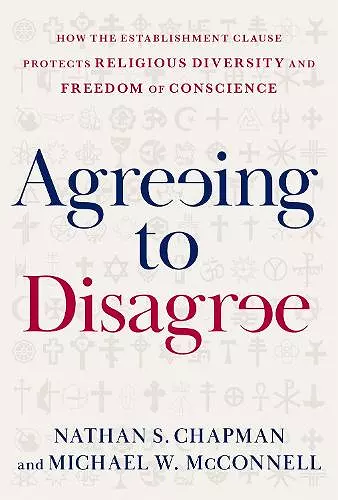Agreeing to Disagree
How the Establishment Clause Protects Religious Diversity and Freedom of Conscience
Michael W McConnell author Nathan S Chapman author
Format:Hardback
Publisher:Oxford University Press Inc
Published:3rd Aug '23
Should be back in stock very soon

In one of the most thorough accounts of the Establishment Clause of the First Amendment, Nathan S. Chapman and Michael W. McConnell provide an insightful overview of the legal history and meaning of the clause, as well as its value for promoting equal religious freedom and diversity in contemporary America. The Establishment Clause of the First Amendment, "Congress shall make no law respecting an establishment of religion", may be the most contentious and misunderstood provision of the entire U.S. Constitution. It lies at the heart of America's culture wars. But what, exactly, is an "establishment of religion"? And what is a law "respecting" it? Many commentators reduce the clause to "the separation of church and state." This implies that church and state are at odds, that the public sphere must be secular, and that the Establishment Clause is in tension with the Free Exercise of Religion Clause. All of these implications misconstrue the Establishment Clause's original purpose and enduring value for a religiously pluralistic society. The clause facilitates religious diversity and guarantees equality of religious freedom by prohibiting the government from coercing or inducing citizens to change their religious beliefs and practices. In Agreeing to Disagree, Nathan S. Chapman and Michael W. McConnell detail the theological, political, and philosophical underpinnings of the Establishment Clause, state disestablishment, and the disestablishment norms applied to the states by the Fourteenth Amendment. Americans in the early Republic were intimately acquainted with the laws used in England, the colonies, and early states to enforce religious uniformity. The Establishment Clause was understood to prohibit the government from incentivizing such uniformity. Chapman and McConnell show how the U.S. Supreme Court has largely implemented these purposes in cases addressing prayer in school, state funding of religious schools, religious symbols on public property, and limits on religious accommodations. In one of the most thorough accounts of the Establishment Clause, Chapman and McConnell argue that the clause is best understood as a constitutional commitment for Americans to agree to disagree about matters of faith.
Chapman and McConnell take the reader on an illuminating journey through British and early American establishments, relevant developments in the nineteenth century, and eight decades of modern Establishment Clause interpretation. Building on a well-articulated view of the clause's animating values, they argue that a jurisprudence rooted in history will yield greater religious liberty and pluralism. Agreeing to Disagree enters the constitutional discourse at an especially critical time now that the Supreme Court has moved into the uncharted interpretive territory of 'historical practices and understandings.' * Angela C. Carmella, Professor of Law, Seton Hall University School of Law *
Chapman and McConnell provide a clear-eyed and carefully crafted defense for the first freedom stated in the Bill of Rights. Their discussion of religious accommodations is essential reading, as it can help lower the temperature and advance the political pluralism to which the nation is committed. * Abner S. Greene, author of Against Obligation: The Multiple Sources of Authority in a Liberal Democracy *
Chapman and McConnell draw on decades of their scholarly analysis and litigation experience to offer the broader public a concise and jargon-free guide to the First Amendment's religion clauses. This elegant book makes a persuasive case that we cannot interpret the Constitution's non-establishment directive without a deep historical appreciation for the type of established church the Founding generations feared. The resulting principles call for an approach grounded in pluralism rather than secularism and offer a framework for the many law and religion controversies that will almost certainly come before the Supreme Court. * Chaim Saiman, Professor of Law, Villanova University Charles Widger School of Law *
The First Amendment prohibition on religious establishments was one of America's most original contributions to Western constitutionalism. But it has become deeply controversial in recent Supreme Court cases and culture wars. In Agreeing to Disagree, two of the nation's leading scholars of religious liberty call for a return to the American founders' cardinal insight that liberty, justice, and civic peace are best served when government remains neutral toward religion and avoids coercing or inducing any religious beliefs or practices. Judges, scholars, and interested citizens alike will find much to savor in this bracing and brilliant text. * John Witte, Jr., co-author of Religion and the American Constitutional Experiment *
Outstanding new book. * Law and Liberty *
The Kennedy Court's rejection of secularist suppression was the perfect moment for the justices to substitute this norm for its ahistorical secularist mandates. Sometimes, the antidote to bad doctrine is better doctrine, not no doctrine at all. But the Court has unfortunately chosen to proceed by dead historical reckoning. There is no better compass for that journey than Agreeing to Disagree. * Gerard Bradley, Public Discourse *
Agreeing to Disagree combines deep expertise with a style and structure that facilitate a comprehensive introduction to the Establishment Clause's historical meaning and enduring importance. * Nick Reaves, Benjamin Sanford, The Independent Review *
ISBN: 9780195304664
Dimensions: 211mm x 149mm x 23mm
Weight: 381g
240 pages